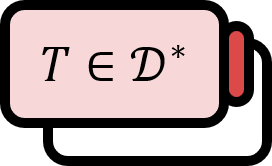Convergence in Schwartz Spaces
Definition
Let us assume that a sequence in the Schwartz space is denoted by $\left\{ \phi_{n} \right\}$. If for all multi-indexes $\alpha$, $\beta$, the sequence $\left\{ \mathbf{x}^{\beta}D^{\alpha}\phi_{n}(\mathbf{x}) \right\}$ converges uniformly to $0$, then we define that $\left\{ \phi_{n} \right\}$ converges to $0$ and denote it as follows.
$$ \phi_{n} \overset{\mathcal{S}}{\to} 0 $$
Explanation
By generalizing the above definition, if $\left\{ \phi_{n}-\phi \right\}$ converges to $0$, we can say that $\left\{ \phi_{n} \right\}$ converges to $\phi$.
$$ \forall \alpha, \beta,\quad \left( \mathbf{x}^{\beta}D^{\alpha}\phi_{n} - \phi \right) \overset{\mathcal{S}}{\to} 0 \implies \phi_{n} \overset{\mathcal{S}}{\to} \phi $$
The Schwartz space $\mathcal{S}$ is an extension of the space of test functions $\mathcal{D}$, designed to properly define the Fourier transform of distributions. Therefore, convergence in $\mathcal{D}$ must guarantee convergence in $\mathcal{S}$ for the concept to be well-defined.
Theorem
Let us consider a sequence $\left\{ \phi_{n} \right\}$ that converges in $\mathcal{D}$. Then, it converges in $\mathcal{S}$.
$$ \phi_{n} \overset{\mathcal{D}}{\to} 0 \implies \phi_{n} \overset{\mathcal{S}}{\to} 0 $$
Proof
Assume a sequence $\left\{ \phi_{n} \right\}$ converges to $0$ in $\mathcal{D}$. According to the definition, for every $\phi_{n}$, there exists a compact set $K$ that satisfies the following.
$$ \mathrm{supp}\phi_{n} \subset K $$
Then, for some positive number $r>0$, $K\subset \overline{B}(r)$ holds true. Here, $\overline{B}(r)$ is a closed ball centered at the origin with radius $r$. Therefore, the following equation is valid.
$$ \left| \mathbf{x}^{\beta}D^{\alpha}\phi_{n}(\mathbf{x}) \right|\le r^{\left| \beta \right| }\sup \limits_{\left| \mathbf{x} \right|\le r }\left| D^{\alpha}\phi_{n}(\mathbf{x}) \right| ,\quad \forall \mathbf{x}\in\mathbb{R}^{n} $$
Given the assumption, for all $\alpha$, $\left\{ D^{\alpha}\phi_{n} \right\}$ converges uniformly to $0$. Hence, by the above inequality, $\left\{ \mathbf{x}^{\beta}D^{\alpha}\phi_{n}(\mathbf{x}) \right\}$ also converges uniformly to $0$.
■
